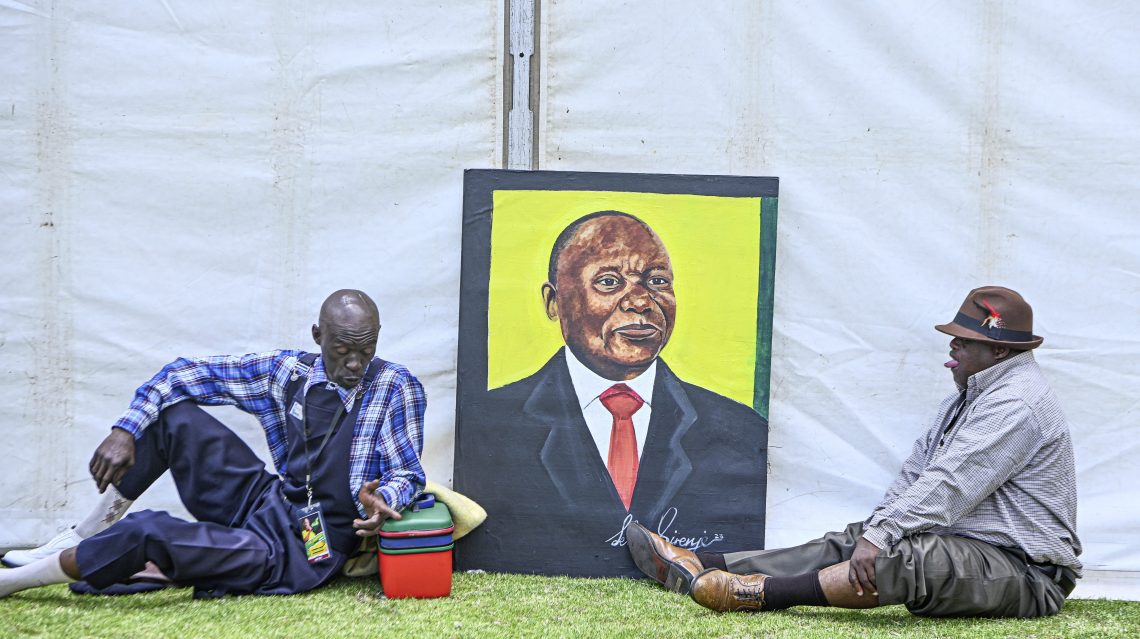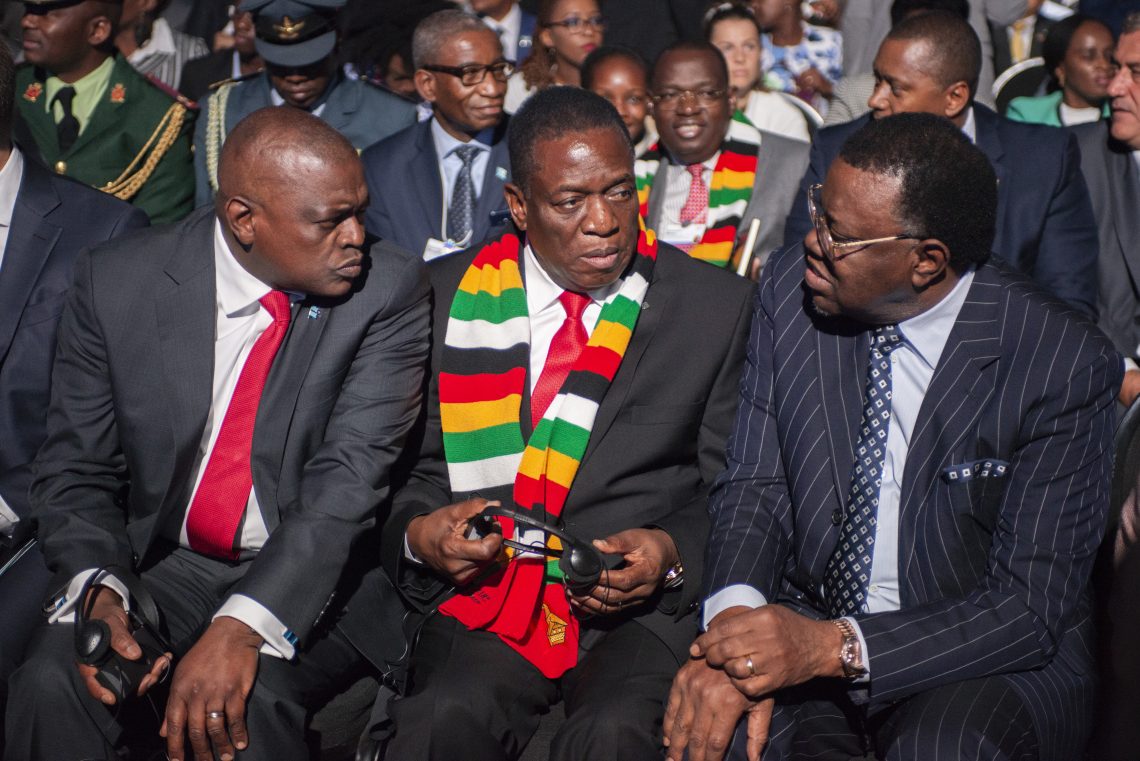Upcoming elections in Zimbabwe, Botswana and South Africa will have major implications for political stability, democratic consolidation and regional relations.
 January 2023: A painting of South African President Cyril Ramaphosa at the African National Congress’ 111th anniversary celebrations in Bloemfontein, South Africa. Ahead of next year’s elections, the party faces widespread criticism over corruption and declining public services and infrastructure. © Getty Images
January 2023: A painting of South African President Cyril Ramaphosa at the African National Congress’ 111th anniversary celebrations in Bloemfontein, South Africa. Ahead of next year’s elections, the party faces widespread criticism over corruption and declining public services and infrastructure. © Getty Images
×In a nutshell
Elections in Zimbabwe are unlikely to bring leadership changes
The opposition in Botswana aims to unseat the ruling party
South Africa’s ballot poses risks to the long-dominant ANC
Three crucial elections will be held in Southern Africa Development Community (SADC) countries this year and in 2024. Their results will offer insight into political stability, democratic consolidation and trade relations within the region.
In 2024, both Botswana and South Africa are set to host general elections, while Zimbabweans will vote this August. Zimbabwe has so far seen intensive crackdowns on the opposition and independent media, amid a proliferation of corruption by political leaders. As for South Africa and Botswana, the races bring out notable points of comparison with regional implications. To varying degrees, both countries are success stories of democratic consolidation in postliberation societies, while Zimbabwe is nearly a failed state.
Liberation parties
In Zimbabwe, the August elections are not likely to bring about any change of leadership. The opposition has no realistic prospects of unseating the Zimbabwe African National Union-Patriotic Front (ZANU-PF), which has been in power since 1987.
In Botswana, the opposition parties are aiming for an upset, seeking to defeat the long-standing ruling Botswana Democratic Party (BDP), currently led by Mokgweetsi Masisi. Mr. Masisi succeeded Ian Khama, who led the BDP after taking over from his father, Seretse Khama, who founded the party that has continuously ruled the country since its independence from the United Kingdom in 1966.
The country’s opposition flexed its muscles in 2022, when the Umbrella for Democratic Change (UDC) coalition won by-elections and the BDP came in last. This gave a glimpse of what is possible in next year’s ballot. The BDP has faced mounting charges of corruption, with the president facing allegations that his family unduly benefited from public utility projects. Despite pressure on the BDP – which now includes criticism from former leader turned opposition member Mr. Khama – the party has been able to maintain political, social and economic stability.
 September 2019: Mokgweetsi Masisi, Botswana’s president (L), Emmerson Mnangagwa, Zimbabwe’s president (C), and Hage Geingob, Namibia’s president, speak together during a plenary session of the 28th World Economic Forum (WEF) on Africa in Cape Town, South Africa. © Getty Images
September 2019: Mokgweetsi Masisi, Botswana’s president (L), Emmerson Mnangagwa, Zimbabwe’s president (C), and Hage Geingob, Namibia’s president, speak together during a plenary session of the 28th World Economic Forum (WEF) on Africa in Cape Town, South Africa. © Getty Images
The major potential shift would be the unseating of the governing liberation party, setting up Botswana to be ruled by a coalition of parties. Unlike in Zimbabwe, Botswana’s political stability does not depend on a change of political leadership in the 2024 elections. The country enjoys sufficient social, economic and political stability to sustain a transition toward a multiparty coalition government, which can eventually improve governmental accountability and performance.
While it aims to end the BDP’s nearly six decades of uninterrupted hold on power, the opposition also draws from former BDP stalwarts such as Mr. Khama, who has fallen out with his father’s party. The BDP’s hold on society is gradually fading, despite having held up better than its regional counterparts. Still, for most citizens, the elections will not bring about drastic changes, apart from some consequences of a more competitive political arena.
ANC struggles
The stakes for South Africa’s 2024 elections are rather different. The race approaches amid intense political crises, including a sharp decline in the quality of governmental services and its ability to meet obligations to citizens. The ruling African National Congress (ANC) faces a make-or-break vote, which could see the former liberation movement lose power for the first time since the beginning of democracy in 1994.
The implications for both South Africa and the region are significant. Intense electricity outages in South Africa and weakening local governments will render the 2024 election a referendum on the ANC. In local elections held in November 2021, the ANC failed to win an outright majority in all the country’s metropolitan municipalities. These local races suggest what is to follow on the national stage.
There is a sense of anxiety over whether any coalition government can address the challenges facing South Africa.
Intensifying corruption coupled with the rapid deterioration of public infrastructure, such as the supply of electricity, have given opposition parties a platform to challenge the ANC’s continued political dominance. Everything hinges on whether opposition parties can form a coalition: whether South Africa will make progress toward building an open, competitive democracy, despite some recent setbacks; or whether the country will further regress in the medium term. There is currently a sense of anxiety regarding whether any coalition government can address the challenges facing South Africa, given various instabilities and the constant change of government across most cities that are governed by coalitions.
×
Scenarios
In Zimbabwe, the August elections do not point to securing the political reforms that would set the country on a path to economic prosperity. The country’s prospects remain dim, barring the unlikely event of drastic changes made in the months ahead.
Botswana has enjoyed stable democracy since independence in 1966, despite a dominant party system that has seen BDP rule for nearly 60 years. The 2024 elections could bring an end to that rule: While this is not expected to usher in major changes to its democratic system, shifting toward a multiparty government could strengthen accountability in Botswana and dislodge the founding elites who have dominated the political system. An effective multiparty democracy could begin a new era in Botswana, which is not currently facing social, political or social instabilities.
For the South African opposition parties approaching the 2024 election, the target remains the removal of the ruling ANC from power and the formation of a coalition government. Since the ANC retains significant electoral support across the country despite its challenges, the party may still play a crucial role in forming any new postelection coalition.
The ballot in South Africa will most likely continue the trend of declining popularity for the ANC, but a defeat would provide no guarantee that a stable, opposition-led coalition is possible in the absence of a single dominant party. Given the level of crises facing the ANC-led government, a scenario with a new, unstable coalition is a risk worth taking for the opposition, in the hopes of laying the groundwork for competitive politics in the country.
In the region’s three elections to be held this year and next, voters will also have an opportunity to evaluate their leaders’ responses to the Covid-19 pandemic and its economic impacts.
Incumbents may find it difficult to survive these elections and inspire confidence in societies whose social and economic fabric has been deeply impacted by the pandemic. The mismanagement of public funds during and since Covid-19 has become a major point of contention for voters demanding greater accountability.

Sign up for our newsletter
Receive insights from our experts every week in your inbox.
Source link : https://www.gisreportsonline.com/r/southern-africa-three-elections/
Author :
Publish date : 2023-07-20 07:00:00
Copyright for syndicated content belongs to the linked Source.





